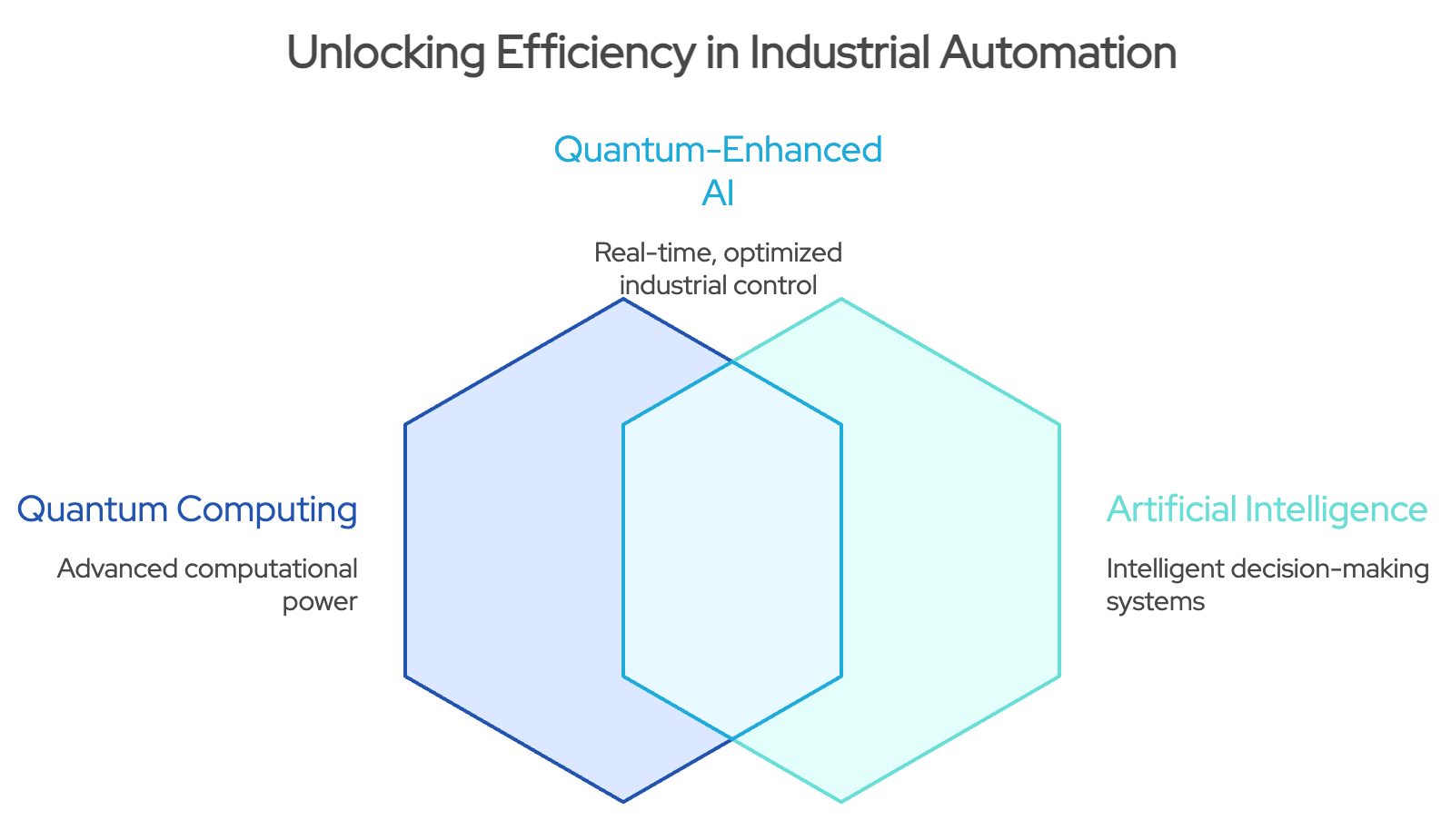In our previous blog about quantum + AI, we looked at the intersection of quantum computing and artificial intelligence, and examined the question “Can quantum computers be used for AI?”. The blog mapped out what’s currently feasible, what’s still conceptual, and where the most exciting breakthrough quantum AI applications may lie, from optimization challenges to next-gen machine learning.
While we’re still early in the expedition, the signs point to a future where these two technologies could reshape how we solve problems.
Next, we’ll explore the very real use cases we’re tackling right now, with the power of quantum, often together with classical computers. This blog will answer the question “How to use Quantum AI?”, specifically for optimization problems.

Industrial automation and process control come with challenges that demand constant optimization, which makes it an ideal candidate for combining quantum with AI. Whether it’s improving yield, maintaining safety, or reducing energy consumption, these goals require balancing multiple dynamic variables, often in real time. Traditional methods for designing and tuning these systems are time-consuming, expensive to manage, and limited in creating efficiency and autonomy.
To create a dynamic, real-time optimization setup, we start off with Reinforcement Learning (RL), which is a branch of AI that learns to optimize through trial and error. But to train RL to make decisions in a high-stakes industrial setting, we can’t experiment directly on live equipment since it’s risky and mistakes will be expensive.
To overcome this, Siemens, IQM, and the project team turned to digital twins: virtual replicas of real-world systems that can safely simulate behavior under different scenarios. The team built a digital twin of the Chylla-Haase polymerization reactor, used in the production of plastics and polymers. This reactor’s operation hinges on carefully managing two critical control variables:
These variables are deeply interdependent and must be adjusted continuously to maintain optimal reactor performance. A small error in control can cascade into reduced product quality, energy inefficiency, or even operational risk.
The bottleneck in today’s classical (only AI) approach is the limitations of conventional digital twin models, typically powered by recurrent neural networks. These models often struggle to accurately capture the nonlinear, time-dependent dynamics of complex reactors, especially under conditions not seen in training data. As a result, RL policies trained on conventional, classical digital twins may not generalize well, creating barriers to safe, scalable, and adaptive automation.
By pushing the boundaries of what digital twins can do, through quantum-enhanced modeling, this Quantum AI project wanted to unlock safer, more robust, and more efficient industrial control strategies.
A better model enables optimized control policies that can lead to higher product yield and reduced energy consumption. But building such a model isn’t easy: it must be precise, especially in simulating complex behavior like temperature changes, which directly affect chemical outcomes.
That’s where quantum computing came in. Using a technique called Quantum Reservoir Computing (QRC), the team trained a model using just 600 historical data points and found that even a small five-qubit system could accurately capture the reactor’s behavior.
In the quest to better understand and predict the behavior of complex systems, quantum reservoirs are emerging as a promising approach. These models are particularly well-suited to capturing nonlinear and temporally intricate dynamics, features common in many advanced engineering systems, such as chemical reactors.
What makes quantum reservoirs especially exciting is their potential to improve generalisation. This means they can make accurate predictions even in situations the model hasn’t seen during training. That’s a game-changer for complex reactors, where the number of variables and possible operating conditions can increase exponentially. Gathering exhaustive training data for every possible scenario quickly becomes unrealistic.
By leveraging the unique capabilities of quantum reservoirs, researchers and engineers could create surrogate models that aren’t just more accurate, but also more adaptable, helping us design, control, and optimize next-generation systems with far greater confidence.
As AI and machine learning evolve from tasks like classification and detection toward generating insights, quantum computing offers the potential to enrich this shift by enabling more expressive and powerful models. Unlike classical computers, quantum computers can efficiently sample from complex probability distributions due to their ability to represent and manipulate superpositions of many correlated states simultaneously.

By designing and training quantum algorithms, researchers aim to steer quantum systems toward generating not just random outputs, but structured, targeted results, with potential applications ranging from fraud detection to drug discovery. While quantum computing still faces challenges, like error correction and hardware limits, a hybrid quantum-classical approach is showing promise, bringing us closer to practical, powerful generative AI.

Martin Leib is a theoretical physicist with a PhD focused on the theory of superconducting qubits. Over the course of his academic and professional career, he’s progressively transitioned from low-level quantum hardware theory to high-level quantum algorithm research. Following postdoctoral appointments in Japan, Scotland, and Innsbruck, Martin joined the quantum algorithms team at the Volkswagen Group, contributing to their quantum computing initiatives.
For the past three and a half years, he’s been with IQM, where he currently works as Head of the Quantum Algorithm and Error Control Department. In this role, he leads theoretical research efforts at the intersection of quantum algorithms and quantum error mitigation and correction, driving advancements in practical quantum computing.

Francesco Benfenati is a physicist with experience in quantum computing algorithms and applications, combining deep technical knowledge with business strategy. At IQM, he works as a Senior Quantum Application Engineer, helping drive quantum adoption across industries by bridging algorithm development and real-world use cases.

Emilia Stuart is a content strategist and storyteller at IQM Quantum Computers, specializing in translating complex quantum computing concepts into engaging narratives. With a background in research and tech marketing, she understands potential customers and crafts stories that resonate. Emilia’s passion is making intricate technologies accessible to diverse audiences.
Search faster—hit Enter instead of clicking.